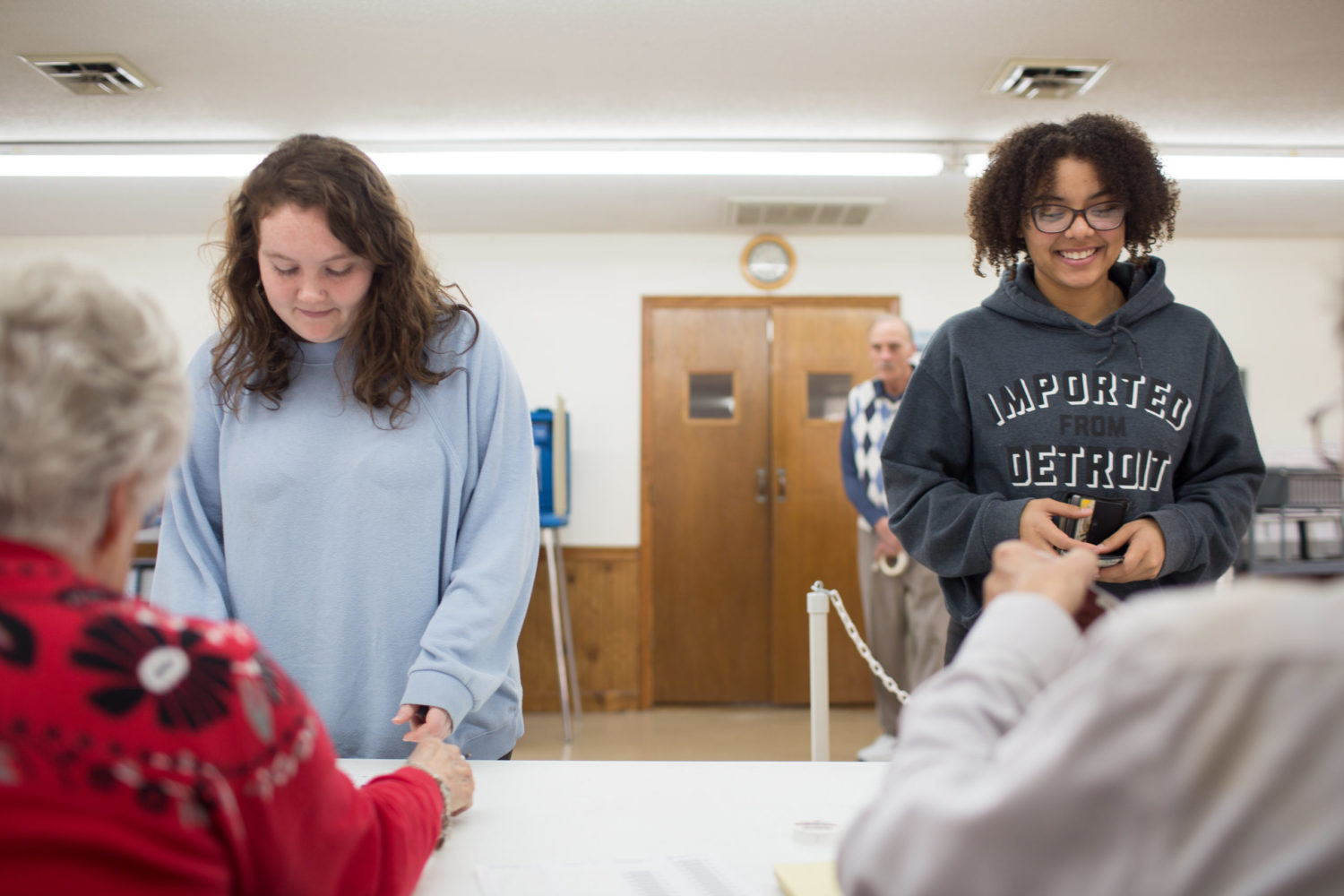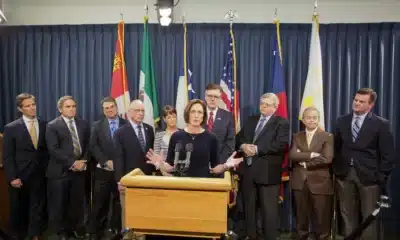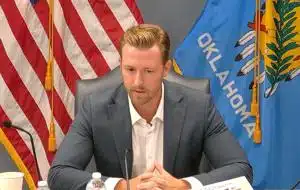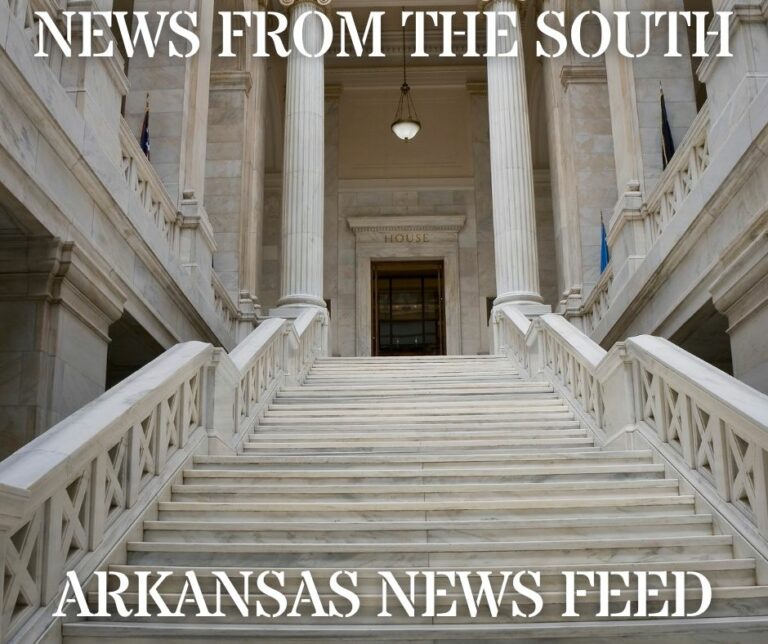News from the South - South Carolina News Feed
US troops won’t be sent to help defend Ukraine, Trump says
SUMMARY: On August 18, 2025, President Donald Trump met with Ukrainian President Volodymyr Zelenskyy and European leaders at the White House to discuss ending Russia’s war against Ukraine. Trump assured that U.S. troops would not be sent to defend Ukraine, dismissing Kyiv’s aspirations to join NATO or regain Crimea as “impossible.” He revealed efforts to arrange direct talks between Putin and Zelenskyy, aiming for peace negotiations. While Putin has expressed openness to security guarantees and a potential meeting, the Kremlin remains noncommittal. Trump expressed optimism about resolving the conflict but noted the complexity of territorial disputes and security demands.
The post US troops won’t be sent to help defend Ukraine, Trump says appeared first on www.abccolumbia.com
News from the South - North Carolina News Feed
Civic education taking low priority in NC
In 2020, while their parents planned pilgrimages to the polls, Henderson County public school students from Kindergarten to 12th grade cast ballots of their own. In this civic education exercise, the youngest grades voted on whether there should be more hopscotches painted on the playground and jump ropes for recess, while grades 3-5 weighed in on whether all citizens 18 and older should be required to vote.
Depending on the grade, students also voted in the U.S. president, North Carolina governor, congressional and school board contests.
Of course, none of it counted toward the results. But the exercise counted in other ways. It taught kids about the importance and impact of voting from an early age.
[Subscribe for FREE to Carolina Public Press’ alerts and weekend roundup newsletters]
Research shows that people who practice voting early tend to become more active voters as adults, said Bettie Liebzeit, co-chair of Students Voting for Democracy, a program run by the Henderson County League of Women Voters and Henderson County Public Schools every two years.
That is, until 2024. After the North Carolina legislature passed the “Parents’ Bill of Rights” in mid-2023, parents had to “opt in” before students could participate in surveys revealing political beliefs.
The legislation sounded the death knell for the mock elections, which were interpreted to be included in the policy.
“The problem was how to keep track of parents opting in, and how the digital facilitator was going to know which students had parents opting in and then sending the ballot electronically,” Liebzeit said. “We’re talking about 14,000 kids here.”
It’s not the first time the General Assembly has hindered civic education efforts, perhaps unintentionally.
In 2009, the legislature passed a law allowing preregistration for 16- and 17-year-olds, including a requirement for county boards of elections to conduct preregistration drives at public high schools. In 2013, the law was repealed. While a court eventually allowed preregistration to continue, the county boards of election education mandate never returned.
The exclusion may have had real impacts.
Research shows that a combination of preregistration and a class demonstration has the largest influence on whether a student will ultimately vote, said Duke political science professor Sunshine Hillygus.
But now that it’s not required, a survey of North Carolina high schools found that only about half were doing any sort of voter registration at all, she said.

This is the second article in Civics Unlearned, a three-part investigative series from Carolina Public Press. This article explores how conflicting priorities and inconsistent delivery have hamstrung quality civic education.
The first article in this series showed that deprioritized and inconsistent civic education in North Carolina classrooms has likely hindered it from effectively spurring civic engagement evenly across the state. The final article will suggest ways to bolster civic education and engagement, both within and beyond the formal education system.
Civics left behind
Why has teaching civics been given a lower priority and been done in an inconsistent manner in North Carolina? Among the top culprits are standardized testing, STEM education and a polarized political climate, according to interviews with teachers, students and academics.
In 2002, Congress passed a bipartisan education reform bill: No Child Left Behind. The U.S. government was concerned about globalization, and the prospect of competing with the rest of the world economically.
President George W. Bush’s solution? Standardized tests. To get federal funding, states would have to hold their schools accountable by setting standards in subjects like math and reading, seen as measures of economic success.
The problem was, other subjects fell to the wayside as teachers worked frantically to get their students to pass exams. Those subjects included social studies, and more specifically, civics.

“We became very, very concerned about student achievement, especially achievement in the areas that would not only pay people more money, but also would make us economically powerful as a country,” UNC Charlotte political science professor Jason Giersch said.
At the time, North Carolina was already having students take exit exams at the end of each grade in core classes: math, reading, writing, science, history, geography and civics. In 2011, after a testing pushback, the General Assembly removed the state’s civics exams to limit testing to only what was federally required.
Even when there was standardized testing in civics, social studies teachers told Hillygus that it was mostly “smoke and mirrors.” The tests were more about the ability to read a historical passage than actual practical knowledge, they said.
In 2015, No Child Left Behind was axed in favor of the Every Student Succeeds Act, which gave states more flexibility, but still required measuring reading, math and science performance.
Throughout this time period, STEM education — science, technology, engineering and mathematics — was gaining momentum. Again, the focus was on developing a generation of workers who could bring the country economic success.
“There’s a lot of pop these days, especially in higher education, on return on investment,” Giersch said. “So what majors and what classes are going to give a financial return in the form of more earning potential? Not many people argue that your salary is higher if you learn more civics.”
Principals aren’t losing their jobs because of low civics scores or engagement, said youth civic organization GenerationNation executive director Amy Farrell. So naturally, it garners less investment, financially and otherwise.
In fact, according to a 2020 study, the federal government at that time invested 5 cents per K-12 student for civic education, compared to $54 for STEM.
“What we hear a lot from students is that they just don’t hear from adults that this is important,” Farrell said.
Elementary schools might have social studies class once a week, and might have to share the time with science, Farrell said. Civics is perceived as extra, an add-on, despite being one of the primary reasons the public school system exists.
The tides may be shifting. People on both sides of the political aisle are noticing the effects of a civically challenged electorate, Giersch said.
“We have low levels of trust in one another, low levels of trust in democratic systems, low levels of trust in the government, low levels of trust in election results, and a lot of people are saying what we need is more civic education,” he said.
Class cancelled: Polarization enters civics class
A few years ago in Wilmington, John T. Hoggard High School social studies teacher Lindsay Noble asked her principal not to assign her civics classes anymore.
She had taught government and civics courses since 2001, and took pride in her work informing students how to vote and participate in civic society. But about a decade ago, the mood changed.

Students got bolder, and less patient with each other, making civil discussions tenser. Parents wary of teachers pushing political agendas paid more attention — and objected — to lesson plans, and constantly got Noble and her colleagues called into the office.
“When I get to the section of immigration, it’s always been a difficult thing to talk about,” she said “And then abortion also has always been difficult to talk about, and now? Pretty much everything.”
In her colleagues’ English classes, book bans are complicating matters. In their science classes, there’s uncertainty about how to cover evolution. There is no break from parental commentary on teaching, Noble said.
For her, the breaking point came during the pandemic when she was teaching a lesson on the influence of polls, using a contemporary political issue: the Black Lives Matter movement.
Noble had her students, half in person and half virtual, listen to a short NPR podcast discussing a recent poll about whether people felt more emboldened to comment online in the midst of the Black Lives Matter movement. The podcast mentioned President Donald Trump’s rhetoric surrounding the issue.
Suddenly, a parent popped into the Zoom call and accused Noble of indoctrinating her students. Noble didn’t know how to react. She went home and cried. While the administration supported her, it was the last straw. She’s done with civics.
“You try to walk a very, very narrow path so that you don’t offend somebody, but at the same time, you’re trying to teach these students facts,” she said.
In Morganton, Burke Middle College civics teacher Timothy Barnsback said the Parents’ Bill of Rights is “the Citizens United of teaching history.”
“We’re becoming customer service as a result, rather than creating an environment for our students that is best for the very diverse population of students that we have in our classrooms,” he said.
In recent years, membership in the Professional Educators of North Carolina has dropped about 65%, Barnsback said. North Carolina Association of Educators membership also plummeted. That tells him that teachers aren’t willing to put up a fight.
“I don’t think enough teachers are fighting because they’re worried about the public pressure that they may receive, or getting called into the principal’s office because we’re not allowed to teach certain concepts, even though they are probably the things that our students desire the most to learn about,” Barnsback said.
Bryan Proffitt is the vice president of the NCAE, but used to be a social studies teacher in Wake and Durham counties until 2015.
When he was in the classroom, he didn’t feel any political pressure, he said. But now, he hears about it all the time from his peers. He feels that there’s an effort to keep people divided politically, and keeping civic education on the backburner serves that purpose.
With the passage of the Parents’ Bill of Rights and legislation targeting diversity, equity and inclusion efforts in schools and public life, teachers aren’t sure what it is that they can and can’t teach, Proffitt said.
“You also have people that are saying, ‘Look, I just need to follow the rules and be consistent with these standards, whether or not it is meeting kids’ needs, because I’m afraid of getting in trouble. I’m afraid of losing my job,’” he added.
At Rockingham Early College High School in Wentworth, social studies teacher Valencia Abbott isn’t going to let any of that stop her from following the standards as she sees fit.
She gets reported to the principal or called out in public probably every month, she said. She’s the only teacher of color at her school, so it’s “par for the course,” she said.
“I’m not concerned about what the political climate is, or if somebody’s going to get upset,” she said. “It is like, this is what the standards are. This is what my students need. This is what I’m going to teach.”
‘You’re losing me’
While civic education is a crucial factor in eventual civic engagement — or disengagement — other variables have to be considered.
Nearly half of North Carolina’s residents are transplants from other states or countries, according to a 2018 report by Carolina Demography. Their range of educational experiences and backgrounds may play a part in a civic detachment.
“They don’t have a longtime involvement in their communities in terms of civic activities,” Giersch said. “They don’t know what the local politicians are. They don’t know what the issues have been over the past few generations.”

Additionally, while North Carolina is technically purple, upon closer inspection, it’s mostly a stitched together quilt of very red and very blue counties that happen to blend into a violet hue. Giersch wonders whether living in local communities where political outcomes appear so “set in stone” might foster apathy.
Catawba College political science professor Michael Bitzer isn’t surprised kids are turning away from politics. They don’t see a system that’s working, nationally or locally.
“They have known nothing other than the two parties at loggerheads,” he said.
“They’ve known nothing but this polarization environment. So it’s not surprising that they probably see politics as merely battles and war, rather than trying to find the common good and seek some compromise and some achievements and then go on to fight the next battle.”
This article first appeared on Carolina Public Press and is republished here under a Creative Commons Attribution-NoDerivatives 4.0 International License.
The post Civic education taking low priority in NC appeared first on carolinapublicpress.org
Note: The following A.I. based commentary is not part of the original article, reproduced above, but is offered in the hopes that it will promote greater media literacy and critical thinking, by making any potential bias more visible to the reader –Staff Editor.
Political Bias Rating: Center-Left
This article presents a critique of recent legislative actions and political pressures that have limited civic education in North Carolina schools. It highlights concerns about the impact of policies like the Parents’ Bill of Rights and the deprioritization of civics in favor of standardized testing and STEM education. The tone is generally sympathetic to educators and civic engagement advocates who see these developments as hindrances to democratic participation. While it does not explicitly endorse a partisan viewpoint, the focus on challenges posed by conservative-led legislation and the emphasis on the importance of inclusive civic education suggest a center-left perspective. The article aims to inform readers about the consequences of political polarization and policy decisions on education without overt partisanship, but its framing leans toward progressive concerns about access to comprehensive civic learning.
News from the South - North Carolina News Feed
Civics education gaps promote lack of NC democratic engagement
On a national stage, North Carolina often serves as a state to watch for its purple and swingy political nature. However, its own citizens are opting out of civic engagement at higher rates than most of the country, according to the 2024 Civic Health Index. Ineffective civics education could be part of the problem.
Independence High School junior April Alonso knows this firsthand. She struck out the first time she tried getting her fellow students at the Charlotte school to pre-register to vote.
For her AP Government & Politics class, Alonso had to do a service project. So, she enlisted a group of friends to walk around the cafeteria at lunchtime and get 16- and 17-year olds to pre-register.
[Subscribe for FREE to Carolina Public Press’ alerts and weekend roundup newsletters]
They could not have been less interested, she said.
“They seemed pretty uncertain,” Alonso said. “It kind of felt like, if I were to make them register to vote, they would go down a drain or something. Like they acted like it was some kind of punishment.”
The second time around, Alonso sweetened the deal. Anyone who pre-registered would get a few pieces of candy. Suddenly, she had buy-in.
Brandon Rivers has also encountered his fair share of seemingly apathetic students in his time as executive director of the Charlotte Democracy Center, a nonpartisan organization focusing on voter education, specifically in marginalized communities.
Rivers spends a lot of time giving classroom presentations on voting before offering pre-registration to students.
Sometimes, students tell him they’re not interested. Rivers isn’t deterred; he asks them what they care about. Making money? Well, the state government sets tax policy and minimum wage, so they might want to pay attention to that. A safe neighborhood? The city council decides how much to pay local police officers and firefighters, as well as how much to budget for street lighting, so they may be interested in voting in that election.
Bridging the connection between students’ interests and government policy is key to getting them motivated to vote, Rivers said. Making the lesson interesting is also imperative; he’s competing with students’ phones and friends for attention.
Right now, the distractions and disconnect may be winning. According to the 2024 Civic Health Index, North Carolina lags behind most of the country on several key markers of civic engagement.
Turnout in the 2022 midterm elections and voter registration fell short of the national average. North Carolinians regularly discussed political and social issues with friends, families and neighbors less often than in most states. In several areas — participation in public meetings, contacting public officials and frequent consumption of political news — the state placed in the bottom 10 in the nation.

While there could be a host of reasons for North Carolina’s relative disengagement, one factor is at the center of it all: civic education, or the lack thereof.
Civic education teaches students how their government works, and their place in it. If done well, it arms them with the knowledge, confidence and motivation to participate in their local communities, and demonstrates the influence they can have in governmental decision making.
But too often, civic education is pushed to the side to make way for other priorities, and what instruction remains may be watered down to avoid conflict.
This article is the first in Civics Unlearned, a three-part investigative series from Carolina Public Press that explores how, and to what extent, a deprioritization of formal civic education has led to a generation of disengaged and polarized North Carolinians.
This article discusses the problem — civic engagement is relatively low in North Carolina, particularly among youth, and formal civic education doesn’t appear to be doing its part to bolster participation. As a result, public policy only represents a portion of the populace, and a generation of North Carolinians are growing up unprepared to work with each other and their government to solve community problems.
The second article will explore how conflicting priorities and inconsistent delivery have hamstrung quality civic education. The final article will suggest ways to bolster civic education and engagement, both within and beyond the formal education system.
‘It’s really just the Wild West’
In 1997, North Carolina public leaders sensed a looming crisis. They worried that North Carolina’s civic education was inadequate, and would lead to a generation of citizens unprepared to lead their communities.
So they worked with the North Carolina Civic Education Consortium, within the University of North Carolina at Chapel Hill’s School of Government, to develop a report on the state’s civic health.
The report, published in 2003, centered around a phone survey of 800 teens and 800 adults, found that household income was the best predictor of civic engagement. Wealthier adults and students from high-income families were more likely to have worked with others to solve a community issue, discussed political issues at home, contacted public officials and showed interest in voting, among other civic activities.
Two decades later, these patterns persist. White North Carolinians report greater engagement than their Black counterparts in every indicator of civic health besides participation in public meetings. College-educated citizens also surged ahead of citizens with less formal education, and North Carolinians 30 and older reported significantly higher involvement than younger generations.
Education in civics should level the playing field, in theory. But, it isn’t.
North Carolina’s civic education is inconsistently taught, said Burke Middle College civics and personal finance teacher Timothy Barnsback.
“It’s really just the Wild West,” he said. “You have either great civics teachers or not-great civics teachers, and there’s not a whole lot of middle ground. It takes being passionate about it to actually make it a really meaningful course for students.”
Barnsback has been teaching social studies since 2000. He started with middle school, where the curriculum was more about rote knowledge and less about active civic engagement. But now that he teaches high school seniors, he makes an effort to make his instruction more interactive and student-focused.
He doesn’t have to do that. North Carolina’s standards are very flexible — it comes down to how much each individual teacher is willing to invest in their students. Not every teacher has the desire or resources to do so.
There’s some truth to the stereotype that coaches with minimal background in the subect matter are often also assigned the social studies class, Barnsback said. In his years of helping create professional development resources for social studies teachers, he’s noticed a trend of male teachers not specifically trained to teach social studies who bounce between history and civics on the one hand and physical education on the other, depending on where they can get a coaching job.
To exacerbate matters, the state does not designate funding for civic education or service-learning projects, according to an open records request.
While a $120,000 character education budget exists, professional development competes with various other priorities for the relatively small pool of money.
In practice, professional development is “do it yourself and handle it at the local level,” Barnsback said.
“So there’s not a depth of knowledge, and to be honest, there’s not a real investment in teaching it properly,” he added.
Vague state standards
When Rockingham Early College High School social studies teacher Valencia Abbott gets to the lesson about the roles, powers and functions of different types of local governments, she conducts a special assignment called, “Who represents me?”
She divides her students into groups based on their addresses, and has them search for their mayor, town council and other local representatives. Then, she shows them how they can contact these officials if they ever want to bring up an issue or offer their input.

Regardless of whether her students stay in Rockingham County, the lesson will stick with them, Abbott said.
“These are the things that we do in our system that we have, and they know the steps, and then they’ll be less hesitant next time with that,” she said.
While Abbott chooses to connect the standard to real-life civic engagement, she could just as easily present a Powerpoint on the various levels of local government and call it a day. Teaching is very personal, she said; everyone will approach it differently, and trying to enforce any level of uniformity is likely to be a futile exercise.
“I’m going to do my job to the best of my ability, despite my little paycheck every month, but I also know that there are teachers who come in and do the bare minimum every day,” she said.
That doesn’t mean the North Carolina Department of Public Instruction doesn’t try to develop effective content standards.
In 2021, DPI revised the standards, which serve as a guide for local educational authorities as they develop curriculum for their districts.
While North Carolina’s standards integrate civics into broader social studies instruction beginning in kindergarten, no stand-alone civics course exists until high school.
By second grade, students are supposed to be able to “exemplify ways individuals and groups shape communities and contribute to the making of rules and laws,” according to the state standards. In fourth grade, students should be preparing to be “responsible and informed citizens” by studying the state Constitution and separation of powers.
In eighth grade, North Carolinians delve into the founding documents and ideals of the state and nation, and should be able to “use a range of civic approaches to address problems being investigated.”
If this all seems vague to you, you’re not alone.
After the 2021 standards were released, North Carolina earned a failing grade from the conservative educational think tank Fordham Institute, which found the content, rigor, clarity and organization of the standards lacking. The report pulled no punches.
“Grades three and four target state and local government, but not in a way that is likely to promote understanding.”
“…the civics standards for (fifth) grade provide dubious guidance.”
“Here, again, the standards tease big concepts… but offer nothing concrete.”
“Finally, although the inquiry strand includes a category on ‘taking informed action,’ it is thoroughly uninspiring.”
The STEM-first mentality
When Nicole Clarke, a social studies teacher at Vance County’s Clarke Elementary school, came to the U.S. from Jamaica to teach, she quickly realized social studies played second fiddle to math and reading. There was more small group time and interventions in those prioritized subjects.
Teachers take note of the hierarchy.

“Because it’s not a tested subject, and much focus is not placed on it, then people don’t tend to put their all into it like they would do for literacy and math and science,” Clarke said.
Rowan-Salisbury Middle School social studies teacher Eric Shock has heard the same from his peers teaching younger North Carolinians. They tell him that “the STEM mentality” pushes subjects like social studies to the side.
“Elementary teachers will tell me, ‘Oh, well, we include social studies when we’re doing reading activities and we incorporate it that way,’” Shock said. “ But it’s not direct, purposeful social studies instruction. It is reading instruction with a social studies article.”
As a result, Shock’s eighth-graders often have wildly different starting points when they arrive in his class; some are beginning at zero, while others have been extensively taught and tested on their civic knowledge.
Even when they get there, sometimes the class is not their main concern.
“I’ve had students who have come in and said, ‘Well, I’ve got to get my math grade up because I’ve got the (end-of-grade exam),’ or, ‘I’m not feeling really good in science right now, and, that’s a tested subject,’ and I’ve heard parents say that before too,” Shock said,
He feels like social studies has become a “glorified exploratory class,” in line with music or P.E. Meanwhile, robust civics instruction is as important as ever, he said. It teaches students how to critically think.
“With the rise of social media, my classroom, social studies teachers’ classrooms, we are the front line in the war against misinformation,” Shock said. “We’re the front line in the war against bias.”
Broken civic education
Civic education is broken, and has been for decades, according to a book co-authored by Duke political science professor Sunshine Hillygus.
The goal of civic education is to develop civic-minded adults, but her research found a very small relationship between civic education and voting turnout from the 1950s to the 2000s.
That doesn’t mean civic education is a waste of time, Hillygus said. Rather, it means civics needs an overhaul to meet its full potential.
Too much of civic education is focused on historical facts and figures, memorizing dates and recalling key events, at the expense of more practical knowledge like how to register to vote, cast a ballot and participate in the current political environment, she said.
Schools also need to instill political motivation and perseverance into students who may face an uphill battle their first time navigating the voting system. Studies show that voting is a habit; once someone votes once, they tend to repeat the practice. The opposite is also true; each year someone goes without voting, the less likely they are to start participating.

UNC Charlotte political science professor and researcher Jason Giersch found similarly lackluster connections between civic education and turnout in a 2018 study.
Alongside his co-author, Giersch determined that social studies and civics course requirements didn’t consistently correlate with higher youth voter registration or turnout.
Giersch wouldn’t read too much into it, he said. The results are likely skewed by the degree of variation in civics instruction across classrooms.
“When you don’t have an exam, if all you have is a list of a curriculum, in the classroom, that could be taught any one of 1,000 different ways,” he said. “So some will be ways that lead towards people being civically active, and some will lead towards students not becoming civically active. And because it’s going in so many different directions, you end up with an insignificant result.”
Sometimes, civics is just plain boring. At least that’s what Alonso hears from her classmates in Mecklenburg County.
Since COVID, people have stopped participating in class discussions, either because they don’t find the subject matter interesting or don’t feel comfortable sharing their opinion. Sometimes, it’s obvious the teacher isn’t passionate about the subject, which leads to bland instruction, but other times, her teachers have tried to make class engaging to no avail, Alonso said.
Kids are distracted by social media, video games and friends. Their attention spans have shortened. And after COVID, they tend to hide away behind their phone or computer screens, she added.
Teachers shy away too, for the most part.
“Most of them are extremely careful with what they say, just because they do not want to offend anyone,” Alonso said. “…The majority of them, I’ll say, are pretty well reserved when it comes to that, and know how to pick out topics where they aren’t as controversial.”
North Carolina student Shrutav Deshpande said none of his teachers want to start a classroom debate; so, instruction is mostly centered on facts and history, with few projects or interactive lessons.
“Sadly, instead of benefiting America, politics has split us in two,” Deshpande said. “Every classroom has members from both sides, and any actual depth into politics could be dangerous.”
The importance of civic education
Civic education begins even before the first day of school.
The way students are raised by their parents and their communities is an early determinant of their eventual civic engagement. For example, if a student’s parents talk about voting, they’re more likely to follow in their footsteps. If there’s no community culture around participating in local politics, it may feel less important.
But formal education plays a significant role, too.
Civic education may be particularly impactful among certain groups who have fewer opportunities to develop civic skills outside of the classroom. Nearly 30% of students learn about civics only or mostly in schools, according to a 2022 report by the Center for Information and Research on Civic Learning and Engagement.
White rural youth and Black and Latino men are overrepresented in these groups. On the other hand, urban teens tended to receive higher quality civic education, including media literacy lessons, classroom discussions and service learning opportunities.
Civic education builds a student’s concept of the world and their place in society outside of family, said Bryan Proffitt, former high school social studies teacher and vice president of the North Carolina Association of Educators. It is crucial that it doesn’t take shortcuts, he said.
If students are able to pass a civics class by reciting the roles of the three branches of government, they’re probably not going to be prepared to understand what it means to vote, follow a debate or participate in a school board meeting, Proffitt said. The world isn’t “uncomplicated” or “uncontroversial,” he said; effective civic education needs to encompass all of its nuance.
“There is an incredibly consequential political decision that is up in the next election,” he said. “Do we have a set of people who are able to think for themselves, versus a set of people who are just going to believe whatever propaganda someone foists on them?”
But the impact of lagging civic education goes beyond voting and participation, Clarke said. If done properly, it teaches kids to solve problems together, to feel heard and valued and to be informed and respectful adults, she said.
“There are some values that kids need to learn and take with them wherever they go, and if civics is not being taught, then I don’t see how they will make good choices in their everyday life,” Clarke said.
Less civics, more polarization
Catawba College political science professor Michael Bitzer is worried. While citizens under 45 make up the largest group of registered voters, they turn out to the polls at the lowest rates of all generations, he said.
Older North Carolinians won’t be around forever, and when they’re gone, they’ll leave behind a less engaged electorate to make the decisions.

“How will those decisions be made and who will be making them?” Bitzer asked. “Are they the most extreme voices, or are there folks that are more representative of our society broadly?”
It’s political gospel: the fewer people who show up, the more extreme the outcome. The more extreme outcomes, the more polarized a society will become. The more polarized a society, the less trust people have in the government and each other.
Civic education, while seemingly not working at the moment, is uniquely positioned to alleviate the issue. After all, education is the one space that captures nearly all Americans at some point.
If nothing changes, youth will continue to be underrepresented in the electorate.
“The reason that Social Security is the third rail of politics, rather than education spending, is because old people vote and young people don’t,” Hillygus said.
Civic education doesn’t just teach people how to vote. It is also supposed to raise the next generation of leaders by teaching students how to disagree civilly — something not often represented in today’s contentious political world, youth civic organization GenerationNation executive director Amy Farrell said.
“It’s how to disagree about something and not be horrible to each other; to have conversations about things and to listen to the other side,” she said.
This article first appeared on Carolina Public Press and is republished here under a Creative Commons Attribution-NoDerivatives 4.0 International License.
The post Civics education gaps promote lack of NC democratic engagement appeared first on carolinapublicpress.org
Note: The following A.I. based commentary is not part of the original article, reproduced above, but is offered in the hopes that it will promote greater media literacy and critical thinking, by making any potential bias more visible to the reader –Staff Editor.
Political Bias Rating: Center-Left
This article primarily focuses on the challenges and shortcomings of civic education in North Carolina and its impact on civic engagement, particularly youth participation. It emphasizes the importance of comprehensive and well-supported civics education, critiques the lack of funding and inconsistent standards, and highlights systemic inequities related to race and socioeconomic status. The piece advocates for educational reforms and greater investment in civic learning, often aligning with typical center-left concerns about equitable education, inclusive participation, and the need for government-supported public services. However, it maintains a largely nonpartisan tone by including multiple expert perspectives and by avoiding partisan framing, reflecting a moderate progressive viewpoint focused on strengthening democracy through education.
News from the South - South Carolina News Feed
Hurricane Erin latest track and impacts expected along East Coast
SUMMARY: Hurricane Aaron, recently upgraded to a Category 4 with 130 mph winds, is undergoing eye wall replacement and is expected to turn north-northwest at 12 mph. This turn may bring outer bands affecting parts of North Carolina and coastal areas, including Virginia Beach, with tropical storm-force winds, high surf (6-12 feet), and life-threatening rip currents. Wave heights near the storm’s center could exceed 40-50 feet. Models agree on its path, keeping impacts mainly offshore but prompting close monitoring. Meanwhile, warm, humid conditions persist inland with highs in the low 90s and scattered thunderstorms expected later this week. Additional tropical disturbances near Africa are also being watched.
Hurricane Erin has intensified into a category 4 Storm as of the 11 p.m. update.
Subscribe to WYFF on YouTube now for more: http://bit.ly/1mUvbJX
Get more Greenville news: http://www.wyff4.com
Like us: http://www.facebook.com/WYFF4
Follow us: http://twitter.com/wyffnews4
Instagram: https://www.instagram.com/wyffnews4/
-
News from the South - Tennessee News Feed5 days ago
GRAPHIC VIDEO WARNING: Man shot several times at point-blank range outside Memphis convenience store
-
News from the South - Texas News Feed5 days ago
Kratom poisoning calls climb in Texas
-
News from the South - Texas News Feed2 days ago
New Texas laws go into effect as school year starts
-
News from the South - Florida News Feed2 days ago
Floridians lose tens of millions to romance scams
-
News from the South - Kentucky News Feed5 days ago
Unsealed warrant reveals IRS claims of millions in unreported sales at Central Kentucky restaurants
-
News from the South - Arkansas News Feed7 days ago
Idaho is losing OB-GYNs. Doctors who remain are trying to shoulder the extra burdens.
-
Mississippi Today5 days ago
‘Get a life,’ Sen. Roger Wicker says of constituents
-
News from the South - Georgia News Feed7 days ago
Cold case murder solved: Nicole Alston’s murder | FOX 5 News













































